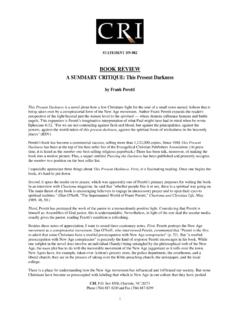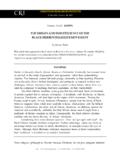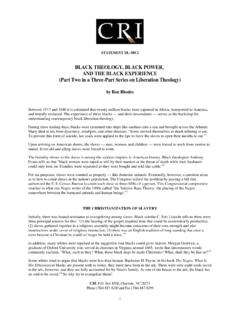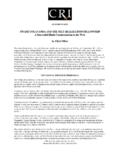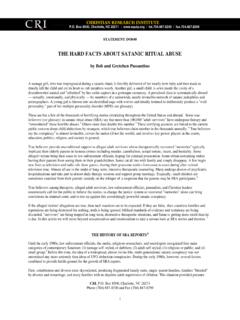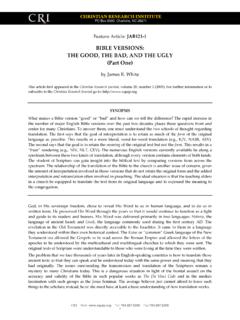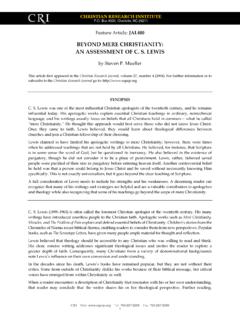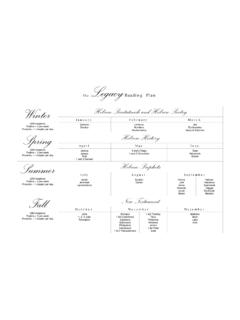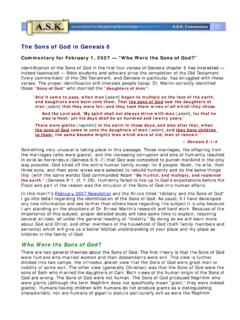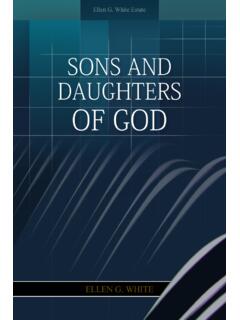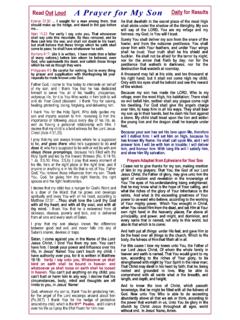Transcription of WHO ARE THE SONS OF GOD IN GENESIS 6?
1 RESEARCH Box8500,Charlotte, NC 28271 Article:JAG062 WHO ARE THE sons OFGOD IN GENESIS 6?This article first appeared in the Practical Hermeneutics column of theChristian Research Journal, volume 27, number 3(2004). For further information or to subscribe to theChristian Research Journalgo to: ve probably heard someone say, Everyone interprets the Bible differently. Itdepends on how youlook at it! Often it does depend on how we look at it; our point of view and assumptions often affect ourinterpretations. What we assume influences how we see things, and that includes how we see sometimes explains whythere are different interpretations of the same Bible passage: conflictinginterpretations often result from different assumptions. We can illustrate this by considering the differentinterpretations of the phrase sons of God in GENESIS 6 interpreters claim that in the Old Testament the phrase sons of God always refersto angels.
2 The phrase is used in Hosea 1:10 to refer to humans, but advocates of the angels view arguethat this phrase cannot mean the same thing as it does in GENESIS 6 because Hosea used the singular formof the word God, El, whereas the writer of GENESIS 6 used the plural form,Elohim. The assumption hereis that because these passages do not use precisely the same terms, they are not referring to the samething. This assumption is incorrect, however, because different words are often used to refer to the samething. The wordsElandElohimare frequently used interchangeably in the Old Testament, and there is nodoubt that both passages refer to God. It is notthe case, therefore, that sons of God alwaysrefers advocates of the angels view point to Job 1:6 and 2:1 to support their claim that sons of God refersto angels.
3 They argue that since it refers to angels in Job, then it also refers toangels in GENESIS 6. In thiscase the assumption is the opposite of the one above; that is, these passages must refer to the same thingsimply because they use the same terms. This is not necessarily true, however. Words or phrases oftenmean different things or are used differently in different contexts. The phrase Son of Man, for example,refers to Ezekiel in the book of Ezekiel, but in the Gospels it refers to Jesus. One must demonstrate fromthe context of the passages in GENESIS and Job that sons of God means the same thing in both passagesand not simply assume this is the case because the words are the passages in Job are also used to argue that sons of God refers tofallenangels. There is nothing inthese passages, however, that indicates that they are fallenangels.
4 Job 1:6, for example, says, the sons ofGod came to present themselves before the Lord, and Satan also came among them. 1 Satan was not oneof the sons of God, but came in among them. In Job, the reference to the sons of God does not includefallen angels such as Satan. Additionally, it seems very unlikely that the expression sons of God wouldbe used to refer to fallen angels. This argument incorrectly assumes that the two passages are referring tothe same thingsimply because they use the same commentators appeal to Jude 6 7 to support their contention that the sons of God wereunfallenor heavenly angels who then fellbecausethey had sexual relations with female humans. They argue thatJude compared the prideful fallen angels to the sexually immoral people of Sodom and Gomorrah. Theproblem with this assertion is that it assumes what it must prove.
5 Proponents of this argument use theirinterpretation of GENESIS 6 to understand Jude, and then use their understanding of Jude to support theirinterpretation of GENESIS 6. This is circular angels view also assumes that angels canhave sexual relations with female humans. Bruce Waltkepoints out, however, This Jesus statement that angels do not marry ( :30; Mark 12:25). It is one thing for angels to eat and drink (see Gen. 19:1 3), but quite another to marryand reproduce. 2 Some interpreters respond that Jesus was referring only to the marriage to the marriage bed, but this makes Jesus statement nonsensical in its own context. Jesus wasresponding to the question about having a marital relation resulting in children, and He clearly deniedthat heavenly angels can have sexual defenders respond that Jesus is referring to angels in heaven, whereas GENESIS 6 is referring tofallen angels.
6 The problem with this explanation is that prior to having sexual relations with femalehumans, these fallen angels must have been unfallen,heavenly angels; but Jesus said heavenly angelscouldnothave sexual relations, and, therefore, they could not have committed the very act that issupposed to have caused them to fall. Furthermore, this view not only assumes that unfallen angels canhavesexual relations with female humans but also that it is necessarily sinful. No commentator hasattempted to prove this view claims that the phrase sons of God in GENESIS 6 refers to male humans whowere possessed by demons. If the term sons of God does not refer to angelic beings (demons), however,then there is no reference to them in the text at all.
7 These interpreters assume the involvement of fallenangelic beings from the angels view and smuggle this assumption intothe text while eliminating the onlyterm that could refer to them. This is called begging the question : the conclusion is assumed and usedas part of the of Seth are not always detrimental to an interpreter s argument. Advocates ofthe line of Seth view assume that the identity of the sons of God in GENESIS 6 should be determinedfrom its context before appealing to Job or Jude. This view holds that the sons of God refers to thedescendents of Seth, while the daughters of men refers to the descendents of Cain. In other words, therighteous line of Seth intermarried with the unrighteous line of Cain resulting in the corruption s look at some arguments for this interpretation.
8 First, several statements in GENESIS about Seth sdescendants indicate that sons of God applies to them: they began to call upon the name of the Lord (4:26), walked with God (5:24), and found favor in the eyes of the Lord (6:8).Second, GENESIS 5:1 3 restates that Adam was created in God s image and that Seth was begotten inAdam s image. The implication is that the line of Adam through Seth constitutes the sons of , the line of Cain is pictured in exactly the opposite light. Cain is driven out from the presence ofGod. Lamech, a descendent of Cain, takes two wives, contrary to the standard established in the Cain murders his brother, God confronts him with his deed; yet, when Lamech commits murder,the absence of God is painfully obvious. Cain laments that his punishment is too great to bear, butLamech boasts that he is able to take care of himself he doesn t need God s protection.
9 The primarycharacterization of Cain s line is that they were becoming increasingly separated from , the writer of GENESIS states that the sons of God saw that the daughters of humankind were beautiful ( ). This connects the daughters of humankind in 6:2 with chapter 4. There, in thegenealogy of Cain, the sons of Lamech are named and something is said about each one s impact onsociety; for example, Tubal-cain was the forger of all implements of bronze and iron. Tubal-cain s sister,Naamah, is named, but nothing is said about her. This should make the reader wonder why she wasmentioned at all, especiallysince women were viewed as lower-class citizens. Interestingly, her namemeans beautiful. This is not the same word used in 6:2, but we have already seen that passages do notneed to use the same terms to be wordtob, beautiful or good, in 6:2 sets up another connection with a statement in 3:6: Thewoman saw that the tree was good [tob].
10 The couple in the garden fell into judgment because they tookthe prerogative that belongs only to God deciding what is good. GENESIS 6:2, therefore, is presented asa reenactment of the Fall. The godly line, who were supposed to walk with God, see the daughters ofhumankind from the ungodly line and decide for themselves that they are , both the angels view and the tyrants view try to explain who the sons of God are, but neitherexplains why the story was recorded in GENESIS . From the context, the line of Seth view explains sons of God were and why the story is here. In Exodus 4:22 23, Moses audience, Israel, is identifiedby God as My son, My first-born. These sons of God were about to enter the Promised Land, whichwas populated with people who were not part of the Abrahamic covenant.
